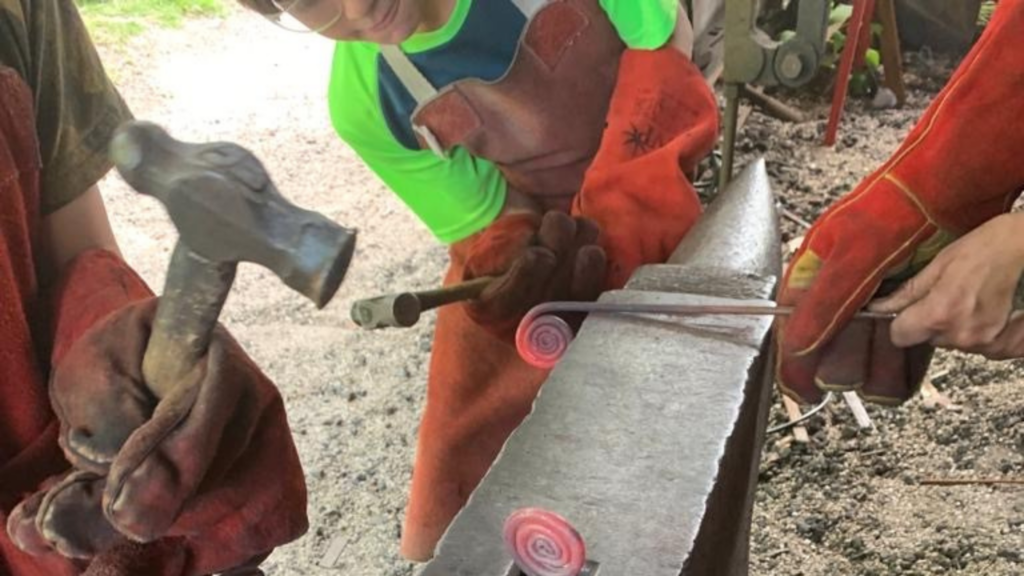Irons in the Fire, by Tom Brown

Part 1: Montessori in the UK
I have so much to talk about. Over the last month [October], I have been involved in so many exciting projects in education, have met so many inspiring educators, and have learnt so much about education in the UK. I have another article on Inquiry-Based Education in the works, but it is going to have to wait. I need to share.
I also need to get my thoughts in order. I am at an interesting point in determining what my work is going to look like in the UK. After two months of networking, coffee shop chats, visiting schools, online workshops, and many hours spent on LinkedIn and Facebook, I suddenly have a lot of irons in the fire. In fact, after months of worrying that I was just twiddling my thumbs, the number of opportunities opening up has become a little overwhelming.
I am starting to see three main pathways forward, each of which promises a mixture of values and skills alignment, a sustainable livelihood, and long-term sustainability.
Values: Like most Montessorians, I want to change the world to become a more peaceful, sustainable, and equitable place through education. The question I have been trying to tackle is how to do this outside of the classroom, and maybe outside of the Montessori community.
Skills: I want to find work that sustains me. I know that mentoring, writing, curriculum design, teaching, relationship-building, and presenting are all activities that energize me. I don’t want to settle for work that feels like drudgery.
Livelihood: Moving to the UK is expensive, and salaries are much lower here. I was paid around £49,000 in the US to teach at a Montessori school. The highest salary I have been offered here for the same job is £32,000. Oof.
Future-planning: I want to be building towards something. I am not a great long-term planner, I prefer to rely on cosmic serendipity, but I think it is time to be a little more ambitious.
So, I hope this series of posts is interesting and not just self-serving. By talking about these three pathways, I will be sharing a lot about what I’ve learned about the education landscape in the UK. In fact, I have so much to share that this post is going to need to stretch into a 2 or 3 parter. This first one will focus on my UK Montessori adventures.
Pathway One: Montessori Education in the UK
I came to the UK as a Montessori Elementary and Adolescent guide. For the majority of my career, I have taught older children in Montessori environments. I love this work, and would happily continue teaching in a Montessori 9-12 or 12-15 classroom – if they existed in the UK.
The Montessori Landscape in the UK is smaller than the US. There are about 600+ Montessori schools in the whole country. Compare that to the US where there are 3,000+ and around 600 of those are publicly-funded. There is only one non fee paying Montessori school in the UK – Windsor Montessori School – although it is still an independent school.
Also, the majority of Montessori schools in the UK are for ages 3-6. There are very few Montessori elementary (6-12) schools, and even fewer secondary (12-18) programs. In fact, there are exactly 4 secondary programs, 2 of which just started this year. Cardiff Montessori School has 8 senior school students, and the Maria Montessori Institute in London has 4! All of these adolescent programs are at least a 2+ hour commute from where I live, and we are not planning on moving.
The educational landscape in the UK is also less Montessori-friendly than the US. The resources, agencies, support, funding, training, legal structure, etc. that we have in the US just don’t exist here. Compared to the vast presence and support of AMS and AMI in the US, here there is MMI and AMI UK. Both have very small teams, I think there is only one employee at AMI UK, and they are located in London. In the course of one month, I’ve pretty much met all the major figures in the UK Montessori world. The training here is also less established. There is no UK AMI elementary trainer, one has to be flown in from the US, and the adolescent training is online with a trainer from Sweden. Most schools cannot afford to train their teachers, and so teachers have to fund their own training or go untrained.
Fundamentally, Montessori schools and Montessori teaching in the UK have to be real labors of love, because there is just no money in it. I don’t know how anyone in the UK survives on a £25,000 salary, which is the average salary for a Montessori teacher. This is only £6,000 higher than the national minimum wage. All the Montessori schools I’ve talked to have said how much they’d love my support through consulting, but they’ve also said that they have no money to pay me.
Setting up Montessori schools for ages 6 and above is really hard because of the licensing demands of Ofsted and the rigors of the National Curriculum, which culminates in high-stakes exams at 16 (GCSEs) and 18 (A-Levels). GCSEs are exams that focus on memorization of content, and so it is hard to square that with a more holistic, student-centered pedagogy. In general, the UK government is aggressively anti alternative education and home education. That being said, there appears to be a huge appetite for alternative education amidst UK families because of some of the current failings of the UK education system. This is something I’ll talk more about in my next post, as I have also spent a lot of time exploring alternative and home education projects in the UK outside of Montessori education.
All in all, this is both a gift and a curse for me. The gift is that I suddenly find myself more experienced and sought after than I was in the US. Also, it is exciting to be part of a growing and developing scene. It feels like I could truly help change things here. The curse is the lack of existing infrastructure and funding. We are not at a stage in our lives where we can afford for me to sacrifice our livelihood for my passion projects.
So far, I have been involved in a number of different Montessori projects both in the UK and in the US. This is one potential path for myself. Continuing to be a Montessori educator, consulting with Montessori schools, working with Montessori organizations, and perhaps long-term looking into becoming a Montessori trainer, head-of-school, or established school consultant. There is also a possibility I might start my own Montessori micro-school for adolescents.
At the moment, once a week, I am supporting Cardiff Montessori in establishing their senior school program. This includes teaching, training and mentoring teachers, developing curriculum, strategic development of the program, etc. I am currently trying to support the Head of School in working out how to both provide a Montessori secondary education and prepare students to take the Welsh GCSE. Oh yes, there is a different GCSE in Wales, a different National Curriculum, and a different inspectorate, Estyn.
I am also looking at helping a small Montessori 6-12 micro-school get started in Bristol. Once a week, I am going to go teach in their environment, as well as support them in the development of their small primary school program. A micro-school can operate for a maximum of 18 hours a week, and legally exists as a tutoring program rather than a school. Therefore, the responsibility for education of the child still rests with the parents as home educators. It is a cool collaboration between parents and two other Montessori educators, and I was able to go sing and play ukulele with their community a few weeks ago. It helped remind me how much I love the classroom.
And then there are a lot of other small projects that I have in the works. Aside from my two substacks, I am potentially going to do some writing for PMAI (Public Montessori in Action International) and AMI UK. It is likely this work will be for free, but will hopefully help build my skills and profile. And, I might be getting some work training other teachers through a couple of online training programs. Eventually, I will have to pick the 2-3 projects I want to stick with, but for now I am enjoying the variety of options and opportunities available.
I still have more to share about Alternative Education in the UK, and some ideas about working in Public Schools or Higher Education. I’ll try and post sometime next week when I have a moment to breathe!
This article – first published here – follows Tom Brown’s journey exploring the Montessori landscape in the UK, since relocating from the US.
About the Author

Tom Brown is a 10+ year AMI Primary and Adolescent guide with an M.Ed. in Montessori Education. He has worked in both public and private Montessori environments in the US and UK. He is currently working as an educational consultant and writer under the name Marigold Education and has supported the growth and development of several Montessori schools and organizations. Tom is also now a member of the board at AMI UK (UK Montessori Society).
You can read more of his writing here and connect with him here.

